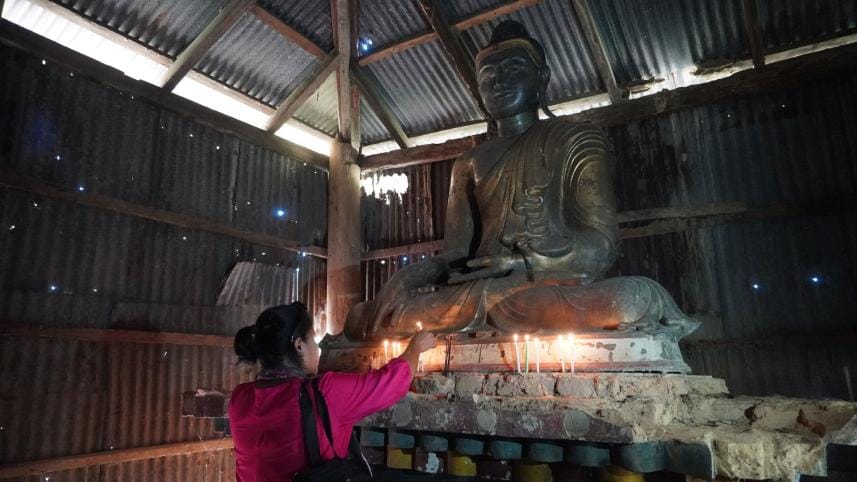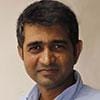A sacred struggle: South Hnila Temple community calls for an end to encroachment

Tears streamed down Maw Ting's face as she lit candles before a Buddha statue over a century old at the South Hnila Boro Buddha Temple in Teknaf, Cox's Bazar today.
It was the first time in years that she and other Buddhist worshippers were allowed to enter the temple's sealed demarcated area, thanks to police protection and a visit by civil society representatives pushing to free the temple from land grabbers.
The land has been embroiled in a long-standing dispute.
According to the temple committee, the conflict began in 2010 when late Mohammad Ali, a former lawmaker for Cox's Bazar-4 (Ukhiya-Teknaf) elected in 1996, allegedly seized the temple land.
His son, Rashed Mahmud Ali, current chairman of Hnila Union Parishad, is accused of continuing the occupation and restricting access to the site.
Locals say the area has seen significant changes, with a large iron gate blocking entry to the hill where the temple, built nearly 200 years ago, once stood.
The original wooden structure, along with other religious buildings, was demolished, leaving only a tin shed room built by Rashed for recreation purposes.
The sacred temple area remains intact on a separate hilltop, and inside the sealed shed, visitors found an ancient Buddha statue and other relics.
Kyaw Zaw Aung, member secretary of the South Hnila Boro Buddha Temple Preservation Committee, recounted how the temple's priests were forcibly evicted in 2010, allowing the former lawmaker's family to take over the land.
Rashed allegedly fortified the area by planting trees and settling other illegal occupants on the hillside.
According to the Bangladesh Survey, two acres of the hilltop are officially designated for the temple, yet efforts to evict the occupiers have stalled.
Civil society members visiting the site vowed to protect the temple, emphasising its cultural and historical significance to the region.
Dhaka University professor Robayet Ferdous condemned the destruction, calling it an attempt to erase the heritage of Cox's Bazar.
The recent visit was organised by the South Hnila Boro Buddha Temple Preservation Committee and the Bangladesh Adivasi Forum.
As the group presented documents at the Teknaf land office, Assistant Commissioner (Land) Arif Ullah Nizamee pledged to take steps to reclaim the land.
Despite previous efforts, including a 2012 district administration list identifying 31 illegal occupants, no successful eviction has occurred.
Cox's Bazar's Revenue Deputy Collector recently issued another directive to remove encroachers, giving the community renewed hope for justice.Efforts to contact Rashed Mahmud Ali, who is also an Awami League leader, have been unsuccessful, as he has reportedly gone into hiding following the fall of the government.




 For all latest news, follow The Daily Star's Google News channel.
For all latest news, follow The Daily Star's Google News channel.
Comments